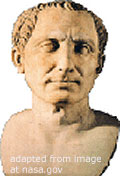Putin’s Power Stirs Russians Watching ‘Julius Caesar’

(Bloomberg – bloomberg.com – Henry Meyer – November 18, 2012)
Vladimir Putin, who has stirred up unprecedented protest to his more than decade-long rule in Russia, was not far from the minds of some watching the Royal Shakespeare Company’s “Julius Caesar” in Moscow.
The story of betrayal and assassination of a dictator followed by civil war, set in a modern-day African country with an all-black cast for the first time in this production, was on its first foreign tour since it premiered in April in the U.K.
“If there are leaders who have brought all the power to themselves and are in danger of inspiring insurrection against them, then that’s what the play says, and Russians must apply that metaphor for themselves,” said the RSC’s artistic director, Gregory Doran, after the show’s opening night at the Moscow Art Theatre of Konstantin Stanislavsky.
The Stratford-Upon-Avon-based theater company was in Russia for the first time in 45 years, having toured the country for the last time in the Soviet era in 1967 under Leonid Brezhnev, who ruled for 18 years until his death in 1982. Putin, 60, a former KGB agent, pushed aside his protege, Dmitry Medvedev, from the presidency to reclaim the top job in May for a new stint that may extend to 2024.
“At certain moments it was even frightening as it reminded me of my country a little,” said Marina Raikina, a theater critic for the Moskovsky Komsomolets newspaper. The actors playing the Roman elite had the same expressions on their faces as modern-day Russian political leaders and oligarchs who “have no connection to reality and live in their own world.”
Mandela Meeting
Doran, who was an anti-Apartheid campaigner, said he got the idea for staging Julius Caesar in an African setting after meeting Nelson Mandela several years ago and learning that he was inspired by this Shakespeare play while imprisoned on Robben Island.
As the Royal Shakespeare Company was examining the proposal, the so-called Arab Spring unfolded in North Africa, overthrowing decades-long strongmen including Libya’s Muammar Qaddafi, making the message of the play even more compelling.
“The question was not, will they get rid of Qaddafi, will they assassinate Qaddafi, because we all knew they would, we all knew he had to go one way or the other,” Doran said. “The question was what will follow Qaddafi. And what happens in Julius Caesar is a play in which Brutus and Cassius haven’t thought it through.
“They have thought through to the assassination. They think then suddenly that everything will be fine. And what happens is they provide a vacuum into which much more ruthless people rush.”
Caesar Conspirators
The play also shows the fickle nature of the common people, says Joseph Mydell, the actor who plays Casca, one of the conspirators who stabs Caesar.
“He is the cynic, he is disparaging about people like Caesar, but also equally, which I think is very important, in my first scene, he is disparaging about the crowd, how fickle the crowd can be, how they can be swayed one way or the other,” Mydell said.
When Mark Antony is allowed to address Caesar’s funeral by Brutus against the advice of Cassius, he succeeds in firing up the crowd against the plotters.
Putin, who was re-elected to the presidency with 64 percent of the vote in March, has lost the support of Russians for a potential new term in 2018. Forty percent would prefer a new leader after Putin’s six-year mandate ends, compared with 34 percent who want him to stay, according to a poll by the independent Levada Center released on Oct. 26.
Medvedev’s Mentor
Medvedev, 47, who hasn’t ruled out a return to the presidency which he occupied for four years while Putin kept the reins of power as prime minister, is showing signs of open conflict with his Kremlin mentor, for example over the state role in the economy.
The play ends up looking like post-Qaddafi in Libya, as Brutus and Cassius, dressed in army camouflage, almost fall out as they fight a losing battle against Mark Antony’s forces.
Russians are not averse to experimenting with Shakespeare. Dmitry Krymov’s fantasy version of “A Midsummer Night’s Dream” that was staged at the World Shakespeare Festival in Stratford and the Edinburgh Festival in August included giant puppets and water sprayed on the audience.
The African Julius Caesar won enthusiastic plaudits, including from the 90-year-old director of the Pushkin Museum, Irina Antonova, who has run the institution since 1961. She said she was “stunned” by the play, which was “spine-tingling.”
The state-run Voice of Russia radio also praised the production. “Doran injected the text with modern music and an African vitality, completely staying true to the words written 400 years ago. The theme of the tragedy — power, betrayal, struggle for freedom, are relevant in any era.”
“Julius Caesar” will be at the Brooklyn Academy of Music, Peter Jay Sharp Building, 30 Lafayette Ave., Brooklyn NY 11217- 1486, from April 10-28 2013. Information: +1-718-636-4182 or http://www.bam.org/programs/2013/winter-spring-season
The show ran at Moscow Art Theatre, 3, Kamergersky Pereulok, 125009 Moscow. Information: +7-495-629-8760 or http://www.mxat.ru/english/
Information: http://www.rsc.org.uk/whats-on/julius-caesar/
